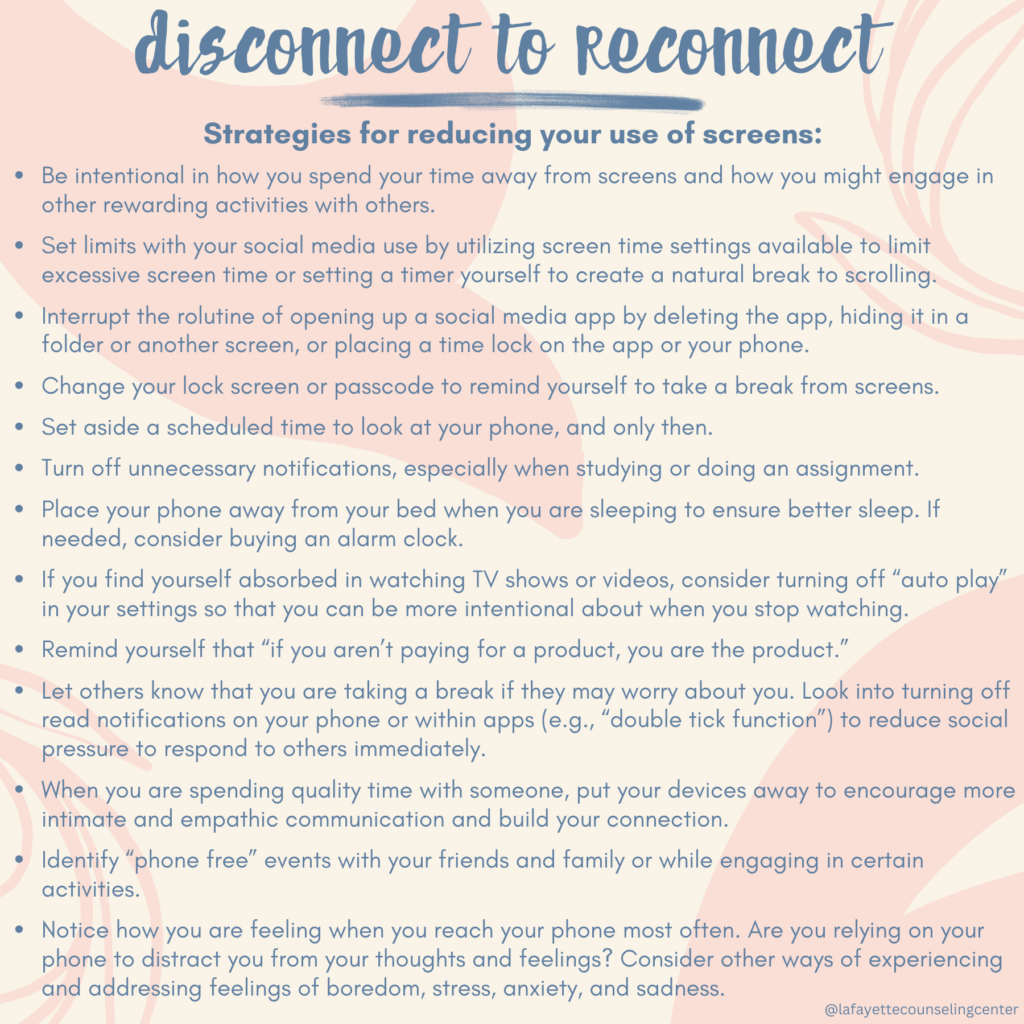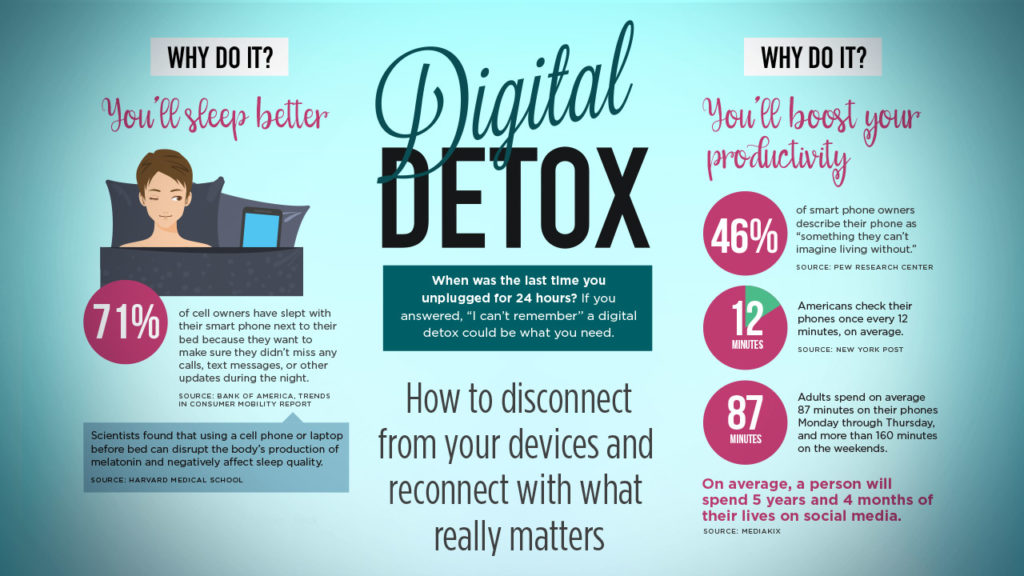Developing a Healthier Relationship with Social Media
With a tap or a few clicks, we can be connected to people all over the world given today’s technology platforms. From TikTok, to Instagram, to Snapchat, there are various apps marketed to provide what we are seeking, which is often connection with others. However, social media typically amplifies what we are feeling in our lives, including both social connection as well as loneliness, depending upon our experiences.
Social media may offer benefits that include access to social groups, maintenance of long-distance friendships, opportunities to meet new people or explore our identities, as well as ways to pursue interests and hobbies. On the other hand, our relationship with social media can come with risks as well, such as interference with necessary tasks and daily routines, exposure to misinformation, online discrimination, cyberbullying, negative self-comparison, sleep disruption, and reduced opportunities to be present and connected with ourselves and others.
Social media is neither inherently good nor bad. Understanding your own relationship with social media and enhancing your social media literacy (the practical, cognitive, and socio-emotional competencies needed to accurately create, review, and share social media content) can be helpful in making choices about the role of social media throughout your life.
Questions to help assess your relationship with social media:
- Am I using social media more than I want to be?
- If and when does my social media use become problematic?
- Do I spend more time on social media than I initially intended to?
- Is my social media interfering with my sleep? Other activities?
- What kind of content do I seek out most often?
- How do I feel during or after scrolling through social media?
- Do I compare myself to others negatively as a result of social media?
- How else might I spend my time in meaningful ways if I reduced my social media consumption?
- What is one small step I can take to have a healthier relationship with social media today?
The American Psychological Association lists a number of competencies related to social media literacy that include:
- questioning the accuracy and representativeness of social media content
- understanding the tactics used to spread mis- and disinformation
- limiting “overgeneralization” and “misestimation” errors that lead users to incorrectly estimate others’ behaviors or attitudes based on social media content (or reactions to content)
- identifying signs of problematic social media use
- learning how to build and nourish healthy relationships online
- navigating how to solve conflicts that can emerge on social media platforms
- determining how to refrain from excessive social comparisons online and/or better understand how images and content can be manipulated
- evaluating how to recognize online structural racism and critique racist messages
- identifying how to safely communicate about mental health online
Interested in learning more? Watch this talk on Social Media and Mental Health
When using social media, ask yourself:
- What are the intentions behind this post?
- How might the photo or content be edited to appear more favorable?
- Is this an accurate representation of others? Check out: Social Media vs Reality
- How might I avoid content that promotes self-harm, harm to others, and disordered eating (e.g., block, mute, unfollow)?
- How might I reduce my exposure to online discrimination and hate?
- How can I change what the algorithm provides me for new content? (e.g., unfollow certain content, scroll quickly past distressing content, create a new account)
- How could my own social media content be used, stored, and shared with others?
- Are there settings within the app or my phone that promote healthier relationships with social media (e.g., privacy settings, time limits, restricted mode)?
Could it help to take a break?
If you ever find yourself experiencing digital overload or feeling distressed due to your relationship with social media, try unplugging for a bit. A “digital detox” simply means intentionally taking time and space away from phones, computers, and screen time. The pause you take can be whatever you feel you need – a few minutes, hours, days, or weeks. You may choose to reduce your use of a particular app or screens more broadly.
Why does taking a digital detox sound easier than it is?
Remember that social media platforms are designed to keep users scrolling endlessly, such that users lose track of time and space. These companies often make money from directing users’ attention to various advertisements and/or the sale of users’ personal data. The algorithms built into social media apps are created to present content that is most interesting and emotionally stimulating for the user, and alter over time based on what content people click on and how long they pause on a post. The user’s scrolling behavior is reinforced by occasionally finding something interesting, similar to getting a payout at a slot machine. Similarly, receiving “Likes” or interest from others for content you share is socially reinforcing.
Recognize that breaking a habit can be hard! Taking your phone out and opening up a specific app may have become a routine for you when you are feeling bored, stressed, anxious, or sad. It may be helpful to remind yourself why you are taking a break from social media or screens more broadly. Sometimes people also describe a “fear of missing out” (FOMO) if they do not have their phone on them, a fear that some social media platforms leverage by displaying content for only a short time period. It may be useful to engage in a behavioral experiment in which you take a break from screens and later assess what you truly missed, as well as what you gained from taking this break.

Being away from your phone is likely to feel uncomfortable at first. However, implementing a digital detox can help you recharge and reconnect with your surroundings and yourself. Identify how you might spend your newfound time in meaningful ways, and reflect on your experience of a digital detox afterward. Remember, small daily habit changes can have a big impact on the role of social media in your life!
For printable Digital Detox Tips, click here.
References:
American Psychological Association. Health advisory on social media use in adolescence. May 2023.
Balt E, Mérelle S, Robinson J, et al. Social media use of adolescents who died by suicide: lessons from a psychological autopsy study. Child Adolesc Psychiatry Ment Health. 2023;17(1):48.
Montag C, Lachmann B, Herrlich M, Zweig K. Addictive Features of Social Media/Messenger Platforms and Freemium Games against the Background of Psychological and Economic Theories. Int J Environ Res Public Health. 2019 Jul 23;16(14): 2612.
Polanco-Levicán K. & Salvo-Garrido S. Understanding Social Media Literacy: A Systematic Review of the Concept and Its Competences. Int J Environ Res Public Health. 2022 Jul 20;19(14): 8807.
Yu, T., & Zhang, G. (2023). College students’ social media addiction and sleep problems: Chain mediating effects of fear of missing out and nocturnal social media use. Social Behavior & Personality: An International Journal, 51(6), 1–9.
